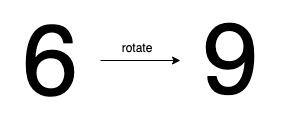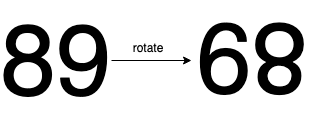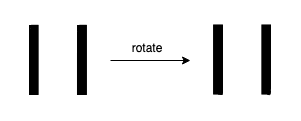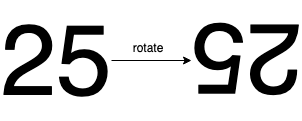Thank you for your support :)
CC BY 4.0 (Attribution 4.0 International)
Leetcode 1056. Confusing Number
Given a number N, return true if and only if it is a confusing number, which satisfies the following condition:
We can rotate digits by 180 degrees to form new digits. When 0, 1, 6, 8, 9 are rotated 180 degrees, they become 0, 1, 9, 8, 6 respectively. When 2, 3, 4, 5 and 7 are rotated 180 degrees, they become invalid. A confusing number is a number that when rotated 180 degrees becomes a different number with each digit valid.
Clarification:
Example 1:

Input: 6
Output: true
Explanation:
We get 9 after rotating 6, 9 is a valid number and 9!=6.
Example 2:

Input: 89
Output: true
Explanation:
We get 68 after rotating 89, 86 is a valid number and 86!=89.
Example 3:

Input: 11
Output: false
Explanation:
We get 11 after rotating 11, 11 is a valid number but the value remains the same, thus 11 is not a confusing number.
Example 4:

Input: 25
Output: false
Explanation:
We get an invalid number after rotating 25.
Assumption:
0 <= N <= 10^9- After the rotation we can ignore leading zeros, for example if after rotation we have
0008then this number is considered as just8.
Result: As below.
Test: As below.
class Solution {
public boolean confusingNumber(int N) {
Map<Integer, Integer> map = new HashMap<>();
map.put(6, 9);
map.put(9, 6);
map.put(0, 0);
map.put(1, 1);
map.put(8, 8);
int newNum = 0;
int tmp = N;
while (tmp != 0) {
if (!map.containsKey(tmp % 10)) {
return false;
}
newNum = 10 * newNum + map.get(tmp % 10);
tmp /= 10;
}
return N == newNum ? false : true;
}
}
| Time Complexity | Space Complexity |
|---|---|
| O(N * length(number)) | O(5) |
| go over一遍1到N的数字,每个数字判定一遍 | 只要用一个有限的hashmap存对应的rotating number |
